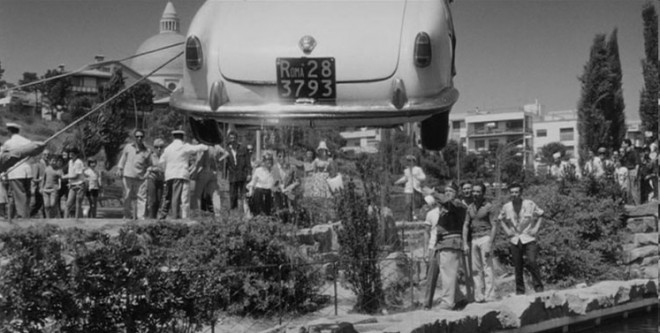A Soviet tragicomedy written wonderfully well by Aleksandr Borodyanskiy and directed by Georgi Daneliya at a fast clip, at least in its urban phase, Afonya charts the slippage into regretfulness of an “indifferent,” self-absorbed 42-year-old plumber who drinks excessively, including on the job, and pursues one woman after another, without giving much thought to them. His fantasies reveal the impossible idyllic life he desires to root out the general dissatisfaction that is the foundation of his oblivious, borderline hedonistic existence. Its immense popularity suggests that the film struck chords of recognition in Russian audiences.
Afanasy Nickolaevich Borshchov—“Afonya”—is this protagonist. Early on, Afonya brings home Kolya, that night’s drinking companion, and his irate girlfriend, who has been waiting for his arrival for hours, blows a fuse, jabs him repeatedly, throws Kolya out twice, and declares she has wasted two years of her life with him before leaving Afonya for good. This is the hilarious trigger for Afonya’s descent into a darker disposition, the feeling that his life is slipping away from him and that he missed opportunities in the past that might have shored up things now. Borodyanskiy and Daneliya do not overtly criticize either Soviet society or culture, but almost every moment shimmers with analytical import underscoring the relevance of this portrait beyond the confines of a character study. Afonya possesses the contextualization and breadth that something like, say, Alfie (Lewis Gilbert, 1966) lacks.
Afonya keeps losing. No students are assigned to him because he is presumed to be incapable of training any budding plumbers properly. He begs for students; but the two boys who are assigned to him beg off from him after just one day. This loss of potential surrogate sons introduces to us Afonya’s likely despair at not having actual children of his own. Rather, A fantasy he has of being married includes a backyard of numerous children arranged in a row.
His wife in this fantasy, it turns out, in reality has no interest in him, a mere plumber.
As it happens, we are in store for a(n unconvincing) happy ending since along the way—not that he is all that interested in her—an attractive young nurse falls in love with Afonya. Before this conclusion arrives, however, Afonya packs up, leaves the city and visits the village where a loving aunt raised him. There, the film’s pace slows down to underscore a frustrated man’s journey into the past. The sheer beauty of the countryside—the open space, the green fields, etc.—adds poignancy to Afonya’s discovery that Aunt Frosya died two years earlier. He was sent a telegram at the time informing him of her death, but it somehow missed connecting with his heart. He now learns that Aunt Frosya had written a stack of letters to herself pretending they were from him, whom she “never tired of waiting for,” although he never came. The insertion of a fantasy-image of this aunt, alive and looking out a window in her home, pierces.
Afonya, the Soviet experiment: what lost opportunities!
A very good film, this—and Leonid Kuravlyov is wonderful as Afonya.
